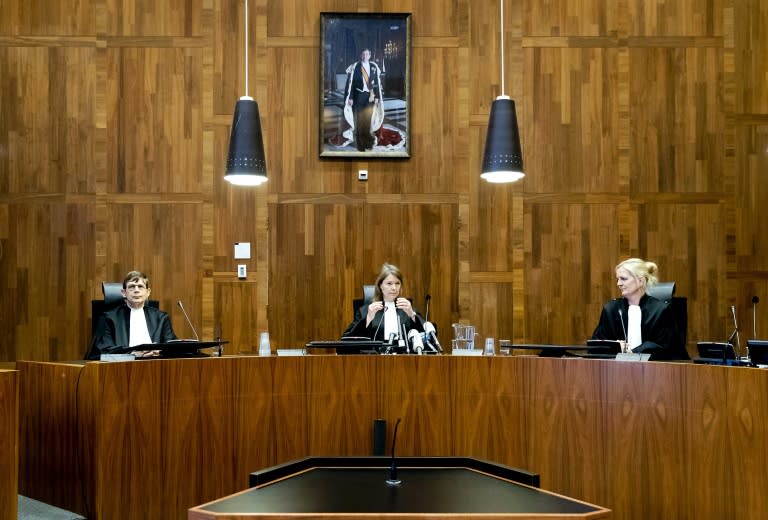Dutch state found partly liable for Srebrenica deaths
A Dutch court ruled Tuesday that the state was partly to blame for the deaths of hundreds of Muslims in Srebrenica, as the 1995 genocide cast another shadow over the country two decades on. "The court finds that the Dutch state acted unlawfully," judge Gepke Dulek said in an hour-long ruling, also ordering the country to pay partial damages to the victims. "The conclusion is that the Dutchbat (Dutch peacekeepers) knew that during the evacuations by the Bosnian Serbs to separate the Muslim men and boys there was a real risk they could face inhumane treatment or execution," Dulek said. The tough ruling, which largely upheld a 2014 decision by a lower court, is yet another twist in a tragedy which shook the Netherlands to the core, and even caused the fall of one government. The Dutch soldiers had "facilitated the separation of the men and the boys" by Bosnian Serb forces, the judge said, adding they should have been "warned of the risks and given the choice whether to stay while their families were evacuated." Letting the men leave the base meant they "were deprived of a chance of survival." Almost 8,000 Muslim men and boys were killed in the July 1995 genocide, Europe's worst atrocity since World War II, when lightly armed Dutch UN peacekeepers were overrun by Bosnian Serb forces in their base in the UN safe haven. Both the Dutch state and the relatives of victims had appealed a 2014 ruling that the state was liable for the deaths of some 350 men who left the base. - Lingering controversy - Relatives of the victims in turn had demanded that the Dutch be held responsible for most of the 8,000 deaths. Some angry shouts broke out in the courtroom as the judge insisted that the ruling applied only to 350 men and boys. Munira Subasic, president of the Mothers of Srebrenica, told Radio Free Europe afterwards it was "discriminatory" against Muslim victims. The Dutch did not let them enter their base at Potocari "even though experts from around the world have said some 50,000 people could have entered and been held there. But they wouldn't let them," she said. The court also ruled the Dutch state was liable for 30 percent of any damages, stopping short of awarding full compensation because it was "uncertain" whether the men would have survived if they had remained inside the compound. Both parties can further appeal to the country's Supreme Court. "What is clear is that the real perpetrators of what happened in Srebrenica are the Bosnian Serbs, not the Dutchbat," Klaas Meijer, spokesman for the Dutch defence ministry, said. He told AFP the government would study the complicated ruling "very carefully because it could have future consequences on other operations" before deciding whether to appeal. Dutch troops are currently involved in operations in Mali, Afghanistan and Iraq. - 'Mission impossible' - Meanwhile, a lawyer for 206 former Dutch peacekeepers said late Monday that they were suing the government for 22,000 euros in damages each for sending them to defend Srebrenica, after the defence minister last year admitted it had been a "mission impossible". Total damages would amount to about 4.5 million euros ($5.1 million). The Dutch troops, entrenched in their base, had taken in thousands of refugees from the enclave. Overwhelmed, the troops at first shut the gates to new arrivals, and then allowed the Bosnian Serbs to evacuate the refugees. The men and boys were separated and taken in buses to their deaths, their bodies dumped in mass graves. Dutch Defence Minister Jeanine Hennis-Plasschaert last year acknowledged the battalion had been sent to Bosnia "without adequate preparation... without the proper means, with little information, to protect a peace that no longer existed." "It was an unrealistic mission, in impossible circumstances," she said. The Hague will also see the conclusion this year of one of the last cases before the International Criminal Tribunal for the Former Yugoslavia (ICTY), with the verdict due in the case of former Bosnian Serb army chief Ratko Mladic. He has denied 11 war crimes, including genocide for the Srebrenica killings.




